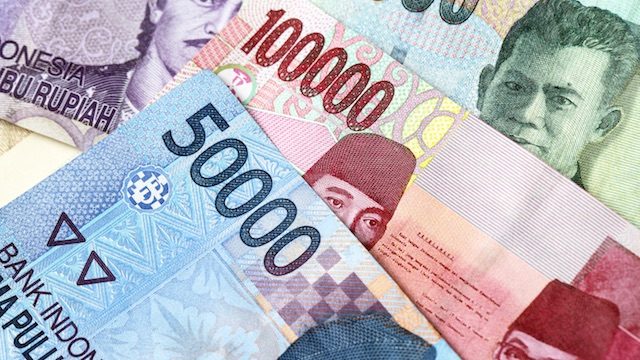SUMMARY
This is AI generated summarization, which may have errors. For context, always refer to the full article.

SINGAPORE – Indonesia‘s rupiah fell 0.57% to a 17-year low on Wednesday, September 23, with research firm Capital Economics saying the country’s foreign exchange reserves have plunged 7.0% since March, indicating the central bank had been intervening to support the currency.
Asian emerging market currencies sank after data showing further weakening in China’s key manufacturing sector added to concerns about the global economy, sending investors flocking to safer assets.
Regional units are already reeling from expectations of a hike in US interest rates later this year, which analysts say could trigger an outflow of capital from emerging markets to seek higher returns.
China’s keenly watched Purchasing Managers’ Index (PMI) for factory activity in September fell to its lowest level since March 2009, the latest round of weak data following disappointing readings including on trade, investment and consumer spending.
“The decline indicates the nation’s manufacturing industry has reached a crucial stage in the structural transformation process,” He Fan, chief economist at Caixin Insight Group said in a statement accompanying the PMI figures.
He blamed the weakness mainly on sluggish external demand for Chinese goods and lower export prices.
Dutch bank ABM Amro said the weak PMI reignited “market worries that the slowdown in China may be more pronounced”.
As the world’s second biggest economy, China is a key engine for global economic growth and any sign of weakness there impacts on world markets.
The Australian dollar, which is heavily reliant on resources exports to China, tumbled 0.76% Wednesday, while other emerging units also suffered in a flight to safety.
South Korea’s won lost 0.72%, the Malaysian ringgit was 0.89% lower and the Indian rupee lost 0.22%.
The Thai baht and Singapore dollar were also lower.
The Japanese yen – considered one of the safest investments in times of crisis – advanced against the dollar and the euro. The dollar bought 119.80 yen compared with 120.14 yen in New York Tuesday, while the euro was at 133.41 yen against 133.74 yen.
Expectations of a US rate hike increased this week after 3 Federal Reserve presidents said they expect to see a lift-off by the year’s end.
Their comments came after the bank held off moving last week, blaming threats from China’s slowdown and turmoil in global markets, which in turn fuelled worries about the health of the United States.
“This is a more widespread risk-aversion story given the backdrop of concern about global growth and concern about emerging-market performance,” Imre Speizer, a senior market strategist at Westpac Banking Corp. in Auckland, said. “The dollar does very well and the yen does, probably, even better in this environment.” – Rappler.com
Photo of rupiah from Shutterstock
Add a comment
How does this make you feel?
There are no comments yet. Add your comment to start the conversation.